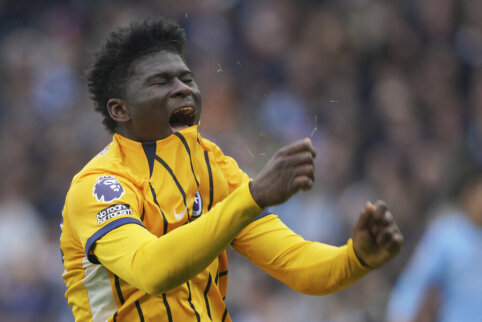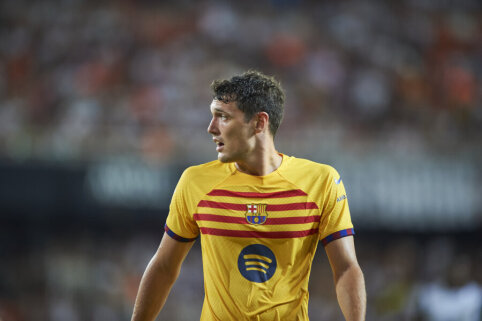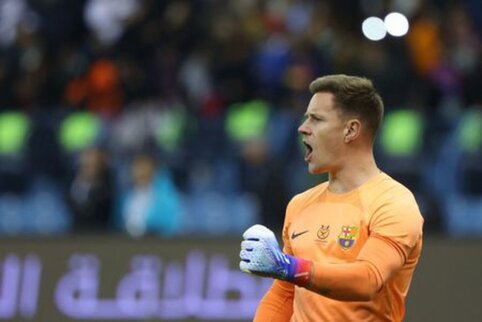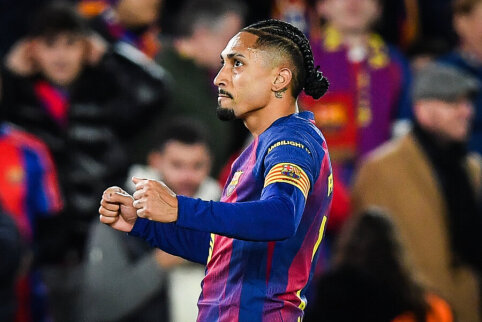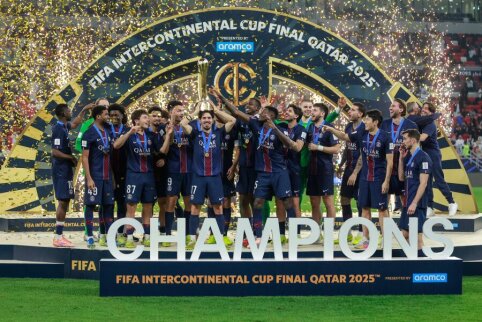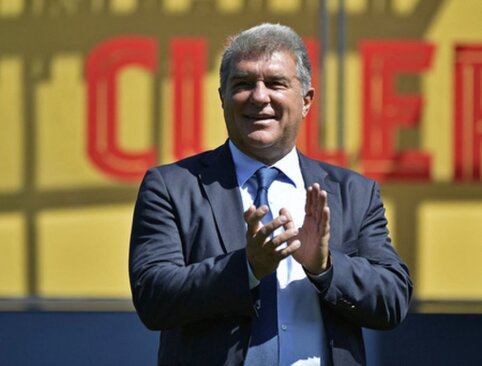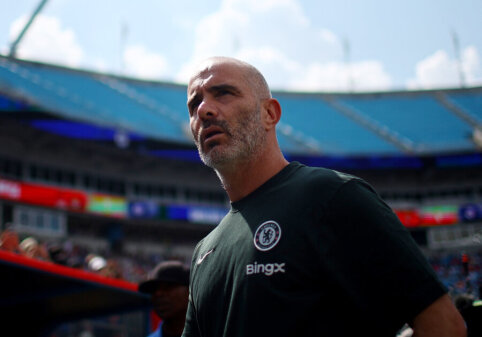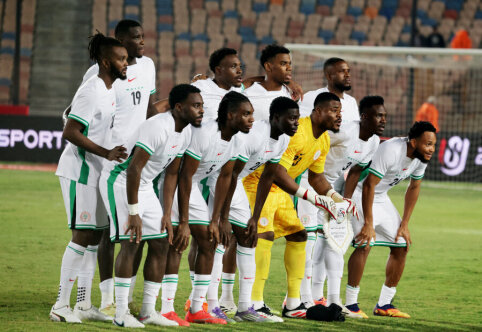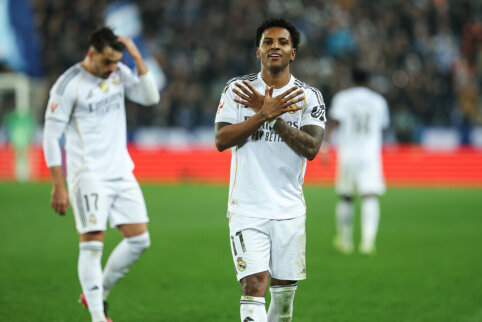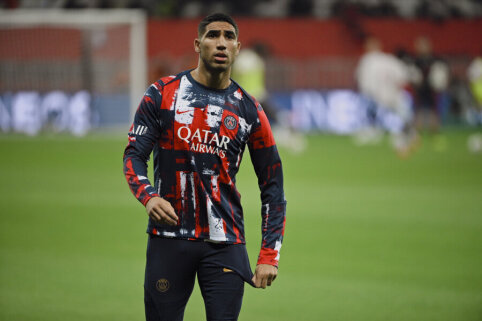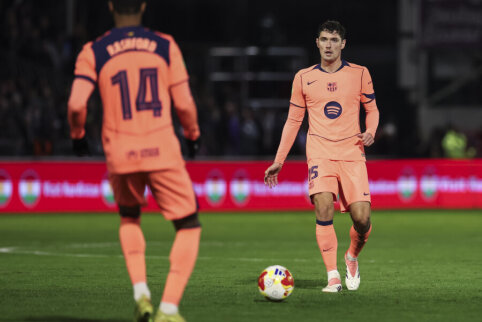 © EuroFootball.com
© EuroFootball.com
The European Football Championship ended as it did four years ago - with Spain's triumph. However, there were many events throughout the championship - more goals, the same Spanish possession without strikers, new tactical schemes. 15min.lt talks about what stood out in this European Championship with Valdas Dambrauskas, assistant coach of Panevezys "Ekranas".
- There were few yellow and red cards shown. Does this indicate a cleaner style of play by the footballers?
- Yes, I would agree. This was influenced by the introduction of fourth and fifth assistant referees, who worked near the goals. It's hard to forget the mistake when a goal for Ukraine was not counted in the match against England.
Later, it was revealed that the ball had indeed crossed the goal line. Despite this, the presence of additional referees near the penalty area greatly contributed to a cleaner game throughout the championship. Maybe they didn't always see everything and made questionable decisions, but the players subconsciously felt that they couldn't fake falling inside the penalty area and demand a penalty kick, as they were being watched.
- However, the mistake in the England-Ukraine match revived old discussions about goal-line technology. Will it finally be implemented?
- We heard that after Ukraine was robbed of a goal, UEFA President Michel Platini and FIFA President Sepp Blatter spoke about the need for goal-line technology.
It's unclear whether this will actually happen, but if other sports such as tennis or rugby use such technologies, why can't football? Especially since it's very simple and doesn't require any interruptions or stoppages during matches. Ukrainians after this championship, and the English after the 2010 World Cup, where they were denied a goal, will remember the pain for another 50 years. Questions always arise about what could have been, what if. This can be avoided.
- Skeptics resist such technologies with the argument of the human element. Will football really become automatic and less interesting because of it?
- If we appoint fourth and fifth referees, it means that we are still trying to reduce the human factor. Now we see that this solution doesn't work, as they still make the same mistakes.
Technology can easily solve this, and I believe that football wouldn't suffer from it. I am against proposed additional breaks during matches and other innovations. Goal-line technology would just help avoid misunderstandings and wouldn't take up any additional time.
- This championship was particularly high-scoring, with many goals scored with headers. What led to this?
- I read that even a third of the goals were scored with headers. I think this is due to the changing tactics in football. Especially after yesterday's Spanish victory, many clubs may start playing without a traditional center forward.
Teams have reached a very high level, and breaking down the opposition in the penalty area is becoming increasingly difficult. Defending teams study the opponent's attack and can defend compactly. Therefore, getting the ball into the penalty area, if you are not a player of the Spanish or German national team, becomes harder.
When there is pressure around the penalty area, there is space on the wings from which the ball can be delivered only by a high cross. And then the chances are equal for whoever takes advantage and scores with a header. Especially if the attacking team has tall players. Germany with Mario Gomez took advantage of this very well.
- The Spaniards showed an example of how to play without a center forward. However, does this formation work only when you have world-class midfielders like Xavi Hernandez or Andres Iniesta?
- I don't think it's exactly like that. Such tactics are not entirely new. Coaches choose the tactics based on the players they have. Yes, Spain in this case has super midfielders, but such tactics have been used in club football before. "Manchester United" in 2008 played similarly for most of the season and won the Champions League. At that time, they had three top-class forwards - Wayne Rooney, Cristiano Ronaldo, and Carlos Tevez. They played without a traditional number 9 and frequently changed positions.
Even earlier, in 1998 and a few years after, Moscow's "Spartak" played with such tactics, and coach Oleg Romantsev received a lot of criticism at that time.
His argument for playing without forwards was simple - the number of forwards does not determine the team's style of play. You can have 3 or 4 forwards on the field, but if the ball doesn't reach them, nothing will come of it. Throughout the season, "Barcelona" played like this. The fact that Jordi Alba signed a contract with this club and there are 8 players from this club in the Spanish national team made the coach's job much easier. Nothing needed to be invented; they are already familiar with each other.
- In the final, the first Spanish goal was scored by David Silva, who was the only player on the field not playing for either "Barcelona" or Madrid's "Real".
- Since he is a truly high-level player, adapting to tactics is very easy for him. David Silva, in my opinion, was one of the best players in the English league last season. Robin van Persie managed to score many goals, but in my opinion, the best player was D. Silva. He is a very similar type of player to Xavi or Andres Iniesta.
- Jordi Alba became the first defender to score in a championship final. Does this also contribute to the trend of disappearing clear player positions?
- Surely, everyone talks about the future player being a universal player. Total football, established 30 years ago, is the football of the future. The Spanish national team and Barcelona demonstrate how boundaries between player positions are disappearing.
Last season, Barcelona played without full-backs, changing the position of the center-back. They, having more space in midfield, become playmakers. In the game of "Barcelona", Carles Puyol and Gerard Pique, who usually connect the defense to attack, were replaced by Sergio Busquets, who is a holding midfielder but also takes on the role of a central defender.
Holding midfielders, creators, who used to play behind the striker, on which the game was built, move into the midfield. Diego Maradona, Zinedine Zidane, and Francesco Totti played in this position. Therefore, today, the tactical and technical preparation of players becomes increasingly important.
The same applies to goalkeepers. In this championship, we saw that the German national team practically played without a goalkeeper. Manuel Neuer came to the center of the field and performed the role of the last defender. In the future, this will be another innovation - the goalkeeper will move further away from the goal and play better with his feet. Especially when the team needs it the most. Just like in ice hockey, risks will be taken, and the goal will be left empty to help the team control the ball.
- The most productive player of the championship, scoring 3 goals, was Fernando Torres, although there were other candidates. Was he the most deserving?
- Well, no one scored more goals than him, and according to the established rules - productive passes and the shortest time spent on the field, he outperformed his opponents.
Interestingly, in 1984 Michel Platini became the most productive player, scoring 9 goals in just 4 or 5 matches, which is fewer matches than are played currently. This shows how football is changing and what kind of players are versatile. At that time, most of the goals were scored by forwards. In the Spanish national team, forwards, defenders, and defensive players like Xabi Alonso all scored.
- Overall, what was the impression of the championship?
- This and the previous 2008 championship were really excellent. Probably thanks to the Spaniards. Their victory the last time was a bit unexpected, and during this championship, they were even called boring. But in the last matches, they proved how they can play. In my opinion, the football played by the Spaniards is ideal, and everyone should strive to play like that. Coaches should teach children to play football following their example.
- What do you think about the planned changes to the championship format by increasing the number of teams to 24?
- I think that currently the level of the European Championship is better than the World Cup. There, teams that qualify from the Caribbean or Asian zones sometimes do not meet the highest level.
Then there are those crushing results with a goal difference of 6 goals. This didn't happen in the European Championship, but if it expanded to 24 teams, the level would definitely suffer. There would be clearly weaker teams that would just come to participate.


